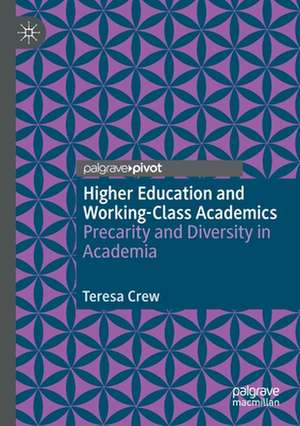Higher Education and Working-Class Academics: Precarity and Diversity in Academia
Autor Teresa Crewen Limba Engleză Paperback – 11 dec 2021
This book examines how a working-class habitus interacts with the elite culture of academia in higher education. Drawing on extensive qualitative data and informed by the work of Pierre Bourdieu, the author presents new ways of examining impostor syndrome, alienation and microaggressions: all common to the working-class experience of academia. The book demonstrates that the term ‘working-class academic’ is not homogenous, and instead illuminates the entanglements of class and academia. Through an examination of such intersections as ethnicity, gender, dis/ability, and place, the author demonstrates the complexity of class and academia in the UK and asks how we can move forward so working-class academics can support both each other and students from all backgrounds.
| Toate formatele și edițiile | Preț | Express |
|---|---|---|
| Paperback (1) | 479.29 lei 6-8 săpt. | |
| Springer International Publishing – 11 dec 2021 | 479.29 lei 6-8 săpt. | |
| Hardback (1) | 484.69 lei 6-8 săpt. | |
| Springer International Publishing – 10 dec 2020 | 484.69 lei 6-8 săpt. |
Preț: 479.29 lei
Nou
Puncte Express: 719
Preț estimativ în valută:
91.71€ • 99.93$ • 77.28£
91.71€ • 99.93$ • 77.28£
Carte tipărită la comandă
Livrare economică 23 aprilie-07 mai
Preluare comenzi: 021 569.72.76
Specificații
ISBN-13: 9783030583545
ISBN-10: 3030583546
Pagini: 147
Ilustrații: XI, 147 p. 7 illus.
Dimensiuni: 148 x 210 mm
Greutate: 0.22 kg
Ediția:1st ed. 2020
Editura: Springer International Publishing
Colecția Palgrave Pivot
Locul publicării:Cham, Switzerland
ISBN-10: 3030583546
Pagini: 147
Ilustrații: XI, 147 p. 7 illus.
Dimensiuni: 148 x 210 mm
Greutate: 0.22 kg
Ediția:1st ed. 2020
Editura: Springer International Publishing
Colecția Palgrave Pivot
Locul publicării:Cham, Switzerland
Cuprins
Chapter 1. Introduction.- Chapter 2. A working-class academic identity.- Chapter 3. Precarity.- Chapter 4. Hostile encounters.- Chapter 5. Supporting students.- Chapter 6. A working-class pedagogy.- Chapter 7. Looking back and moving forward
Notă biografică
Teresa Crew is Senior Lecturer in Social Policy at Bangor University, UK. Her research interests include higher education and social mobility; social capital of vulnerable groups and access to and barriers into employment.
Textul de pe ultima copertă
"This book is a passionate and lyrical account of the workings of class and inequality in higher education. Drawing on the narratives of working class academics, it paints a powerful and compelling picture of the everyday systematic injustices faced by those from working class backgrounds who never lose a sense of being outsiders. The book also shows the way forward, calling for a real democratization of our universities, one based on mutual support, solidarity and the valuing of working class pedagogies."
—Professor Diane Reay, Cambridge University, UK
"Reading this book as a working class academic was not easy, flashes of personal experience of microaggressions, exclusion, and ridicule was in every page. I would urge every Vice Chancellor, head of department and Student Representative to read this book - and to think about their working class students, and staff with more care."
—Dr. Lisa McKenzie, Durham University, UK
This book examines how a working-class habitus interacts with the elite culture of academia in higher education. Drawing on extensive qualitative data and informed by the work of Pierre Bourdieu, the author presents new ways of examining impostor syndrome, alienation and microaggressions: all common to the working-class experience of academia. The book demonstrates that the term ‘working-class academic’ is not homogeneous, and instead illuminates the entanglements of class and academia. Through an examination of such intersections as ethnicity, gender, dis/ability, and place, the author demonstrates the complexity of class and academia in the UK and asks how we can move forward so working-class academics can support both each other and students from all backgrounds.
Teresa Crew is Lecturer in Social Policy at Bangor University, UK. Her research interests include higher education and social mobility; social capital of vulnerable groups and access to and barriers into employment.
Caracteristici
Draws on the work of Pierre Bourdieu to examine the experience of the working-class academic Illustrates that the term 'working-class academic' in itself is not homogenous Examines the numerous intersections of ethnicity, gender, dis/ability and place within academic identity
